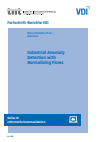Industrial Anomaly Detection with Normalizing Flows
Zusammenfassung
This thesis addresses deep learning-based methods for automatic anomaly detection in an industrial context. It involves image- or sensor-based detection of defects in the production process that can affect the quality of products. Automating this task provides a reliable and cost-effective alternative to humans, who perform this task manually by sighting. Since this setup has special requirements such as detecting previously unknown defects that traditional approaches cannot fulfill, this paper presents anomaly detection methods that learn without any examples of anomalies and include only normal data in the training process. Most of our proposed methods address the problem from a statistical perspective. Based on a deep-learning-based density estimation of the normal data, it is assumed that anomalies are considered unlikely according to the modeled distribution. The density estimation is performed by socalled Normalizing Flows, which, in contrast to conventional neural networks, can model a formally valid probability distribution due to their bijective mapping. Moreover, due to their flexibility, Normalizing Flows allow modeling of more complex distributions in contrast to tradit...
Schlagworte
- 1–12 1 Introduction 1–12
- 13–23 2 Fundamentals 13–23
- 31–49 4 DifferNet 31–49
- 50–62 5 Cross-Scale-Flow 50–62
- 96–109 8 MTS-Flow 96–109
- 110–114 9 Conclusion 110–114
- 115–132 Bibliography 115–132


